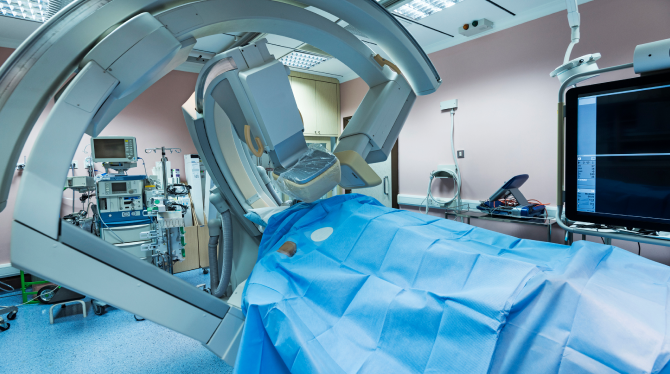Malignant sarcomatoid mesothelioma cells spread quickly, making this illness challenging to treat. Surgery, chemotherapy, and radiation are the most common treatments. Sarcomatoid mesothelioma treatments are available to veterans through the U.S. Department of Veterans Affairs (VA).
What Is Sarcomatoid Mesothelioma?
 Sarcomatoid CellsIllustration of cell type under microscope
Sarcomatoid CellsIllustration of cell type under microscopeSarcomatoid Mesothelioma Cells
Sarcomatoid mesothelioma is one of three mesothelioma cell types. It is the rarest of the three, accounting for roughly 10-20% of all cases. Like the other cell types, sarcomatoid mesothelioma is caused by exposure to asbestos fibers.
Sarcomatoid mesothelial cells are long and spindle-shaped. The shape of the spindle cells makes it more difficult for them to stick together, meaning the cancer cells can spread more quickly through the body.
Veterans and civilians with sarcomatoid tumors don’t usually have a good health outlook (prognosis) as the cancer is highly aggressive and often diagnosed after it has already spread throughout the body.
Thankfully, veterans with sarcomatoid mesothelioma can pursue financial aid and treatments through the VA. Legal compensation may also be available. Get our free Veterans Packet to learn more.
Symptoms of Sarcomatoid Mesothelioma
The symptoms of sarcomatoid mesothelioma start out mildly and worsen as the cancer reaches other parts of the body. Common symptoms include chest pain, cough, and weight loss. Patients may have few (if any) symptoms until the cancer has become widespread.
Sarcomatoid mesothelioma symptoms include:
- Chest or abdominal pain
- Cough/coughing up blood
- Fatigue
- Fluid in the chest wall (pleural effusion)
- Loss of appetite
- Nausea and vomiting
- Shortness of breath
- Unexplained weight loss
If you have a history of asbestos exposure and now have some of the symptoms listed above, see your doctor immediately.
Sarcomatoid Mesothelioma Diagnosis
An early and accurate mesothelioma diagnosis is critical to getting treatments that can extend a patient’s life.
After conducting a physical exam and reviewing symptoms, doctors typically will order imaging tests to look for possibly cancerous growths inside the body.
Commonly used imaging tests for mesothelioma include:
- CT (computed tomography) scans
- MRI (magnetic resonance imaging) scans
- PET (positron emission tomography) scans
- X-rays
If the scans show signs of sarcomatoid mesothelioma, the doctor will order a fluid or tissue sample (biopsy). Biopsies are the only way to confirm if someone has sarcomatoid mesothelioma.
Were you diagnosed with sarcomatoid mesothelioma? Talk to a Patient Advocate now by calling (877) 450-8973 and determine the best path for to your individual diagnosis.
Biopsy samples are sent to pathologists to determine which type of cancer (if any) a patient may have. Sarcomas look very similar to the naked eye, but a biopsy allows pathologists to look at the cells under a microscope and distinguish between them.
When studying a biopsy sample, pathologists may use a technique called immunohistochemistry to find the differences between normal tissue and cancerous tissue.


This technique uses immunohistochemical stains that stick to antibodies and proteins found on sarcomatoid mesothelioma cells. The staining makes it easier to see if the cells are sarcomatoid mesothelioma under the microscope.
Rare Sarcomatoid Mesothelioma Subtypes
Doctors may be able to classify cases of sarcomatoid mesothelioma into rare subtypes when making a diagnosis.
Rare subtypes of sarcomatoid mesothelioma include:
- Desmoplastic mesotheliomaThis cell type accounts for under 1% of sarcomatoid cases and often resembles a normal cell type under the microscope. This can make diagnosing difficult, especially when no other cancer cells are detected.
- Transitional mesotheliomaThis cell type occurs when epithelial cells begin to lose their typical rectangular shape but are not quite spindle-shaped, like sarcomatoid cells. It has been reported in both cases of epithelioid and sarcomatoid mesothelioma. Five percent of sarcomatoid mesothelioma cases are transitional.
- Lymphohistiocytoid mesotheliomaThis cell type was once thought to account for less than 1% of all sarcomatoid cases, and could be mistaken for lymphoma. However, it has recently been reclassified as a subtype of epithelioid mesothelioma. Our team has included it here as some may still believe it is a subtype of sarcomatoid mesothelioma.
Misdiagnosing Sarcomatoid Mesothelioma
Since sarcomatoid mesothelioma is so rare, doctors may not suspect you have cancer at first. As a result, you may be misdiagnosed with a more common illness, especially if you do not undergo imaging scans and a biopsy.
Sarcomatoid mesothelioma may be misdiagnosed as:
- Benign tumors
- Inflammation of the lung lining (fibrous pleurisy)
- Non-Hodgkin’s lymphoma
- Other bone or soft tissue cancers (sarcomas)
See a doctor immediately for a second opinion if you believe you may have been misdiagnosed. You must be accurately diagnosed with mesothelioma to receive the proper treatment. Additionally, delaying a diagnosis can allow the cancer to spread and worsen.
Reduce the chances of a misdiagnosis by working with top sarcomatoid mesothelioma doctors. Find a doctor near you right now.
- Alabama
- Alaska
- Arizona
- Arkansas
- California
- Colorado
- Connecticut
- Delaware
- Florida
- Georgia
- Hawaii
- Idaho
- Illinois
- Indiana
- Iowa
- Kansas
- Kentucky
- Louisiana
- Maine
- Maryland
- Massachusetts
- Michigan
- Minnesota
- Mississippi
- Missouri
- Montana
- Nebraska
- Nevada
- New Hampshire
- New Jersey
- New Mexico
- New York
- North Carolina
- North Dakota
- Ohio
- Oklahoma
- Oregon
- Pennsylvania
- Rhode Island
- South Carolina
- South Dakota
- Tennessee
- Texas
- Utah
- Vermont
- Virginia
- Washington
- Washington DC
- West Virginia
- Wisconsin
- Wyoming
Speak with our trusted advocates to learn more about mesothelioma specialists in your state.
Sarcomatoid Mesothelioma Prognosis
Since sarcomatoid mesothelioma is the most aggressive cell type, patients usually have poor prognoses. Sarcomatoid mesothelioma patients usually live for over 5 months after diagnosis, but some can live longer if the cancer is caught early on.


20+ years helping mesothelioma victims
"[Life expectancy] depends on the cell type. If it's an epithelioid, it's treated better, for lack of a better word. Sarcomatoids are very aggressive."
Keep in mind that a patient's prognosis can change over time. Some patients with sarcomatoid mesothelioma have gone on to live longer lives thanks to effective mesothelioma treatment.
It's important to work with top mesothelioma specialists since treatment is the only way to improve your prognosis. These skilled doctors can prescribe different therapies or surgeries that may help you live longer.
Sarcomatoid Mesothelioma Treatment
The type of treatment for your specific case of mesothelioma depends on the cancer stage, cell type, and other factors. The mainstays of therapy for sarcomatoid mesothelioma are surgery, chemotherapy, and radiation.
Surgery
Mesothelioma surgery may offer the best chance to improve your prognosis. Early-stage patients often qualify for aggressive surgeries because the cancer hasn’t spread throughout the body yet.
Different surgeries can be used depending on where the cancer first forms in the body.
"Surgery, while also an option, tends to be less widely used because [sarcomatoid mesothelioma] spreads so quickly and thus is harder to surgically remove."
—Moffitt Cancer Center
Surgeries to treat sarcomatoid mesothelioma include:
- Cytoreduction with HIPECCombines surgery and heated chemotherapy to treat peritoneal mesothelioma. Doctors first surgically remove all visible cancer tumors from the abdominal lining (peritoneum). They then bathe the abdomen in heated chemotherapy drugs to kill microscopic cancer cells.
- Extrapleural pneumonectomy (EPP)Used in cases of pleural sarcomatoid mesothelioma. Doctors remove the lining of the lungs (pleura), all visible cancer tumors, and the lung closest to the cancer.
- Pleurectomy with decortication (P/D)May also be used to treat malignant pleural mesothelioma as an alternative to an EPP. Doctors remove the lung lining and cancer tumors, but do not take out a lung.
In a case report from The Annals of Thoracic Surgery, pleural sarcomatoid mesothelioma patients who received surgery lived almost twice as long as those who didn’t.
Call (877) 450-8973 if you have mesothelioma. We have a team of on-staff mesothelioma nurses who may be able to help you find treatment options.
Patients may also qualify for minor palliative surgeries to ease pain and other symptoms, even if the cancer is highly advanced and widespread.
Chemotherapy
Because surgery is not always safely available to sarcomatoid mesothelioma patients, chemotherapy is often the next best option. Chemotherapy regimens combine different medications intravenously to kill mesothelioma cells.
The West Los Angeles VA Medical Center — one of the country’s most highly regarded mesothelioma hospitals — takes a unique approach to treat sarcomatoid mesothelioma with chemotherapy. Doctors found that sarcomatoid mesothelioma responds better when treated with chemotherapy drugs for other types of sarcoma.
Pleural sarcomatoid mesothelioma patients treated with chemotherapy had a median survival time of 11 months, according to a recent study from Vall d'Hebron University Hospital.
Radiation
During radiation therapy, doctors aim high-energy X-rays at cancerous tumors to shrink them and kill mesothelioma cells. This treatment method must be used sparingly as it can harm healthy tissues.


Radiation can also be combined with other therapies to give patients the best chance of living longer. One such combination is Surgery for Mesothelioma After Radiation Therapy (SMART), in which patients first receive radiation to shrink tumors before doctors surgically remove them.
Clinical Trials
Besides standard treatment options, there are clinical trials nationwide testing surgical and non-surgical treatments of sarcomatoid mesothelioma. Most trials use traditional chemotherapy along with new types of medicine.
While clinical trials have risks, many patients in these trials improve their chances of living longer. Clinical trials also lead to new mainstream treatments, like immunotherapy.
Get a free veterans packet for more information about mesothelioma treatments.
Help for Veterans With Sarcomatoid Mesothelioma
U.S. veterans do not deserve to develop mesothelioma for serving their country. Sadly, that's precisely what happened when thousands of veterans were exposed to asbestos fibers while they served in the military. The makers of asbestos-based products knew the deadly truth for decades but hid it to keep making money.
Thankfully, veterans with mesothelioma and their loved ones can seek help from the VA, skilled doctors, and top attorneys.
Veterans with mesothelioma can pursue:
- Mesothelioma treatments
Some of the world's best mesothelioma hospitals have partnered with the VA to treat veterans, including the West Los Angeles VA Medical Center, which has unique chemotherapy treatment options for sarcomatoid mesothelioma. Veterans with VA health care can access this treatment at little to no cost.
VA benefits
Besides access to high-quality medical care, veterans can also get monthly financial payouts through VA benefits. Married veterans with mesothelioma receive nearly $4,000 a month via these benefits as of 2024.
Legal compensation
Veterans can file legal claims against makers of asbestos-based products and seek money held in asbestos trust funds with the help of an attorney. A mesothelioma lawsuit settlement awards $1 million on average, and filing a legal claim will not affect a veteran’s ability to file for VA benefits.
Learn more about sarcomatoid mesothelioma and the benefits available to veterans with our free Mesothelioma Veterans Packet.
Sarcomatoid Malignant Mesothelioma FAQs
What causes sarcomatoid mesothelioma?
The only known cause of sarcomatoid mesothelioma (and all other types of mesothelioma) is asbestos exposure.
It is still unknown why some people have epithelial cells, some have sarcomatoid cells, and others will have both cell types present.
What is the difference between epithelioid and sarcomatoid mesothelioma?
The main difference between the epithelioid and sarcomatoid cell types is their shape. According to the Moffitt Cancer Center, epithelial cells are shaped like rectangles, while sarcomatoid cells are spindly.
Though epithelioid mesothelioma cells grow rapidly, their shape makes them more likely to clump together and stay contained to one part of the body. Sarcomatoid cells spread faster because their spindle shape prevents them from sticking together.
Sarcomatoid cells may make up part or all of a tumor. Some patients have a mix of sarcomatoid and epithelioid cells, also known as biphasic mesothelioma.
How can I find doctors to treat sarcomatoid mesothelioma?
Our team can help you find top doctors to treat sarcomatoid mesothelioma right now. Call our team at (877) 450-8973 to find a doctor who can help treat your cancer. Don't wait — when fighting an aggressive form of cancer like mesothelioma, every second counts.


